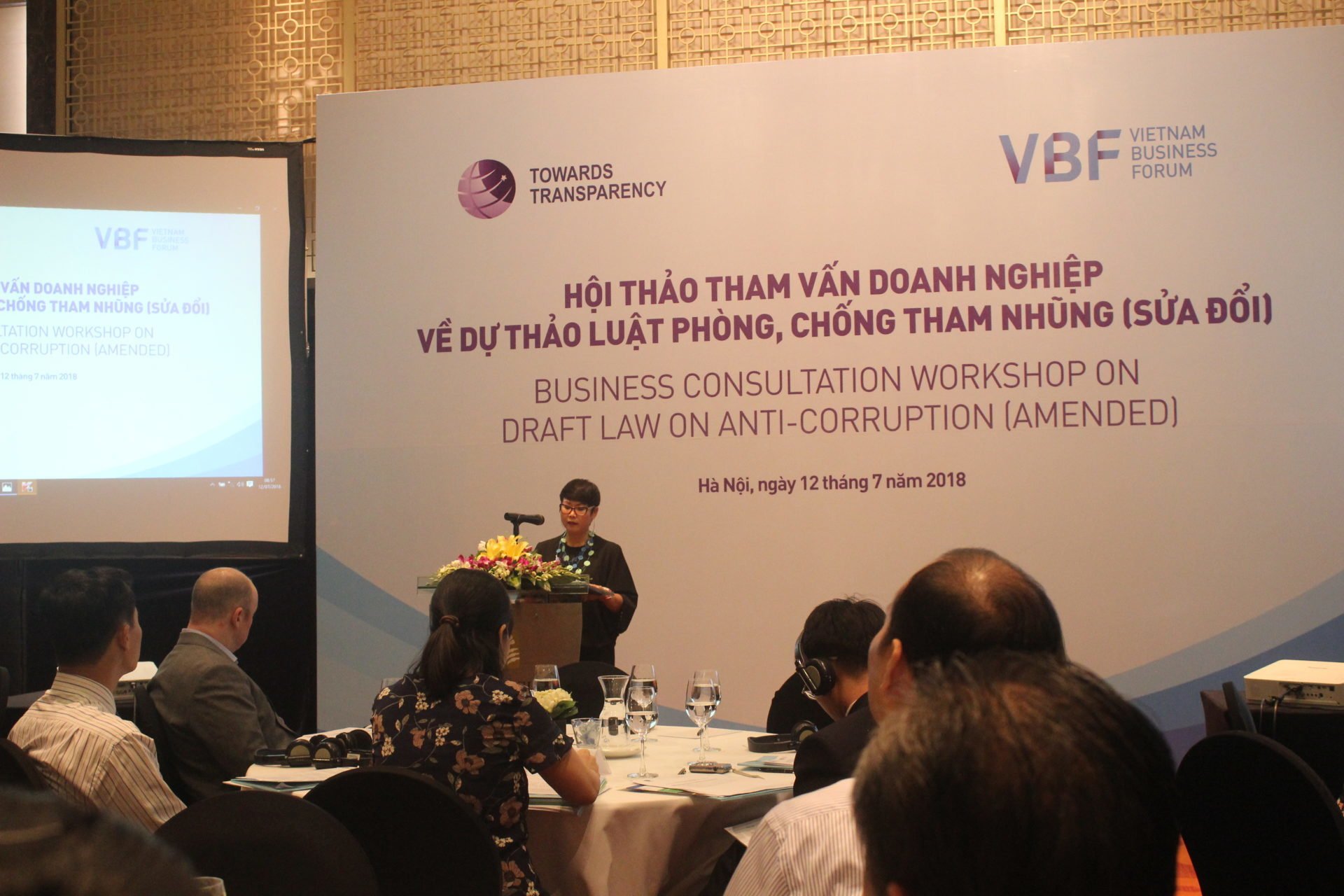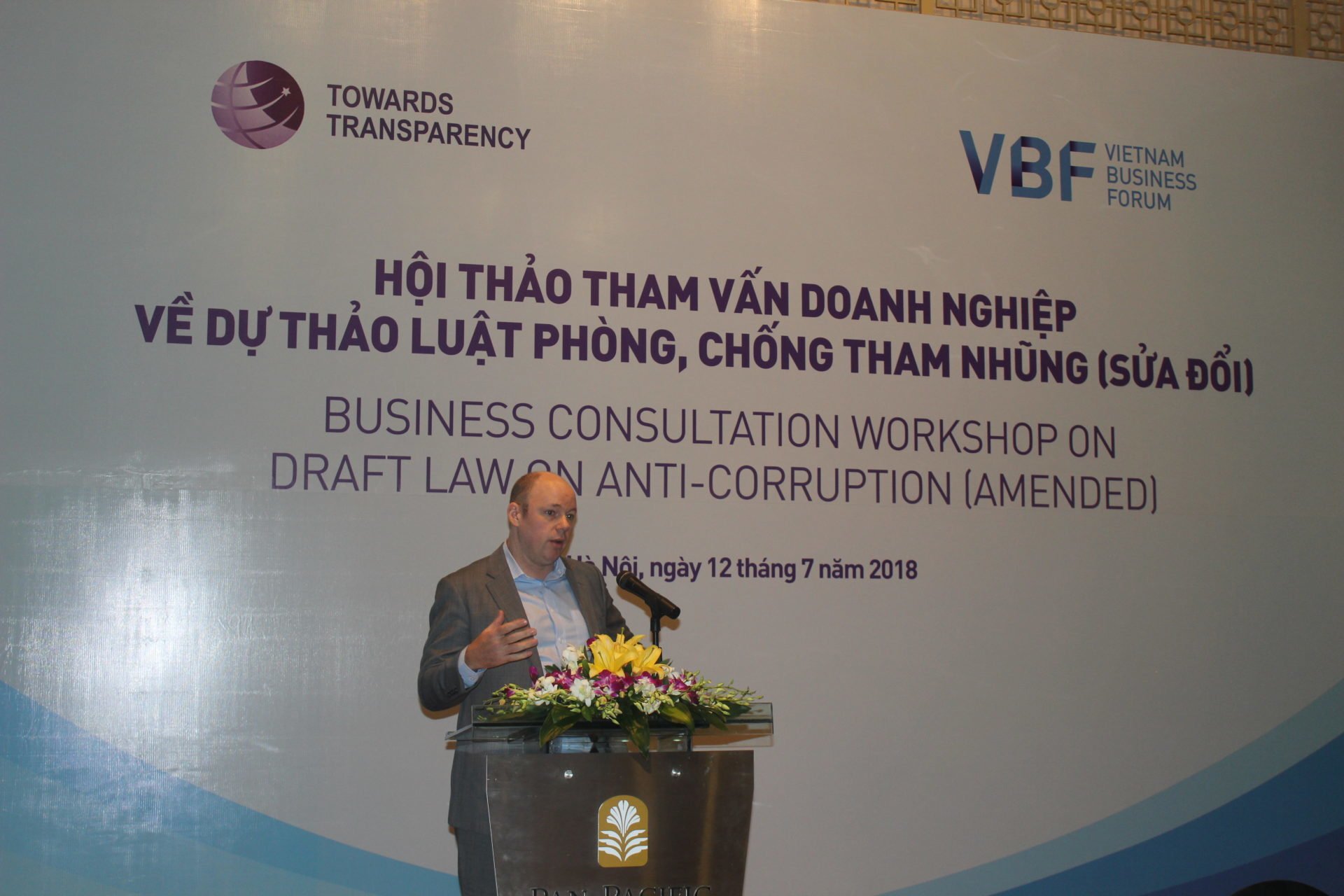Business Consultation Workshop on the Draft Law on Anti-Corruption (amended)
On 12 July 2018, the Business Consultation Workshop on Draft Law on Anti-Corruption (amended) was co-organised by Towards Transparency (TT) – Transparency International (TI)’s National Contact in Vietnam, and the Governance and Integrity Working Group (GIWG) of Vietnam Business Forum (VBF). The workshop was attended by 45 participants from non-state enterprises, development partners and state agencies. Notably, the workshop saw the presence of representatives from the Government Inspectorate (a member of the Editing Team of the Anti-corruption Law Draft), the Central Committee of Internal Affairs and Vietnam Chamber of Commerce and Industry.
Opening the event, Ms. Nguyen Thi Kieu Vien – TT’s Executive Director highlighted the fact that businesses are not only the victims but also the perpetrators of corruption, therefore they should become an integral part of anti-corruption measures in Vietnam. In order to stimulate the participation of enterprises in fighting corruption, it is essential to strengthen the anti-corruption legal framework in the private sector.

Promoting business integrity requires an appropriate and effective legal framework – Ms. Nguyen Thi Kieu Vien (TT’s Executive Director)
A representative from the Government Inspectorate, Ms. Nguyen Bich Huong, also a member of the Anti-corruption Law Editing Team, introduced the provisions focused on the private sector in the new draft law. According to the Draft, non-state enterprises shall be responsible for implementing internal anti-corruption measures. Specifically, two particular groups, namely, publicly- listed companies and credit institutions are required to apply compulsory anti-corruption and preventive measures. Their compliance with these new rules shall be inspected by state agencies. Ms. Huong noted, the expansion of the governing scope stipulated in the draft amended Anti-corruption Law to the non-state sector is, on the one hand, the government effort in addressing the existing loopholes of the current anti-corruption legislations. On the other hand, it is the government’s response to the call for a step-by-step approach to addressing private corruption, which is indicated in the Political Bureau’s Conclusion 10/KL-TW on preventing and fighting corruption and waste.
From the legal standpoint, Mr. Giles T. Cooper – Co-chair of VBF’s GIWG raised his concerns over several controversial issues, including: (1) Lack of clarity of the governing scope on private sector corruption; (2) the feasibility of provisions on responsibilities of non-state enterprises in anti-corruption; (3) the inspection and handling of violations committed by enterprises in applying anti-corruption measures.

The fact that a legal entity as a corporate not being criminalised in corruption cases shall be an obstacle to promoting business integrity – Mr. Giles T Cooper (GIWG’s Co-chair).
At the workshop, positively, most participants agreed on the expansion of anti-corruption Law’s governing scope to private sector. However they pointed out the need to clarify which provisions are mandatory and which one are optional but stimulating for private businesses. They also showed their concern over the feasibility of such provisions. The final message addressed to the Drafting Board was that anti-corruption draft Law, once enacted, should promote business integrity and a level playing field amongst enterprises rather than create extra burdens for them.
After the workshop, to follow up, TT compiled the participants’ key comments and recommendations and addressed them to the Drafting Board and relevant agencies.
This workshop is one of the important activities conducted by Towards Transparency in its efforts to contribute to improving the anti-corruption legislation. This draft law is tentatively to be approved by the National Assembly in its plenary sitting in October 2018.




